Microbiome and Obesity: Pathologies, Therapies, and Future Research
VerifiedAdded on 2023/06/13
|6
|1162
|149
Report
AI Summary
This report delves into the intricate relationship between the human gut microbiome and obesity, highlighting associated pathologies such as cardiovascular diseases, type 2 diabetes, inflammatory bowel disease (IBD), and autism-spectrum disorder. It discusses how alterations in gut microbiota composition can influence the development and progression of these conditions, with specific emphasis on the role of factors like diet and genetics. The report also examines current therapeutic approaches for IBD, noting the limitations of probiotics and prebiotics, and the reliance on antibiotics to manage complications. It underscores the need for more comprehensive research that considers environmental microbes and genetic predispositions to develop effective therapies. This resource is ideal for students seeking detailed insights into the complex interplay between microbiome and obesity.
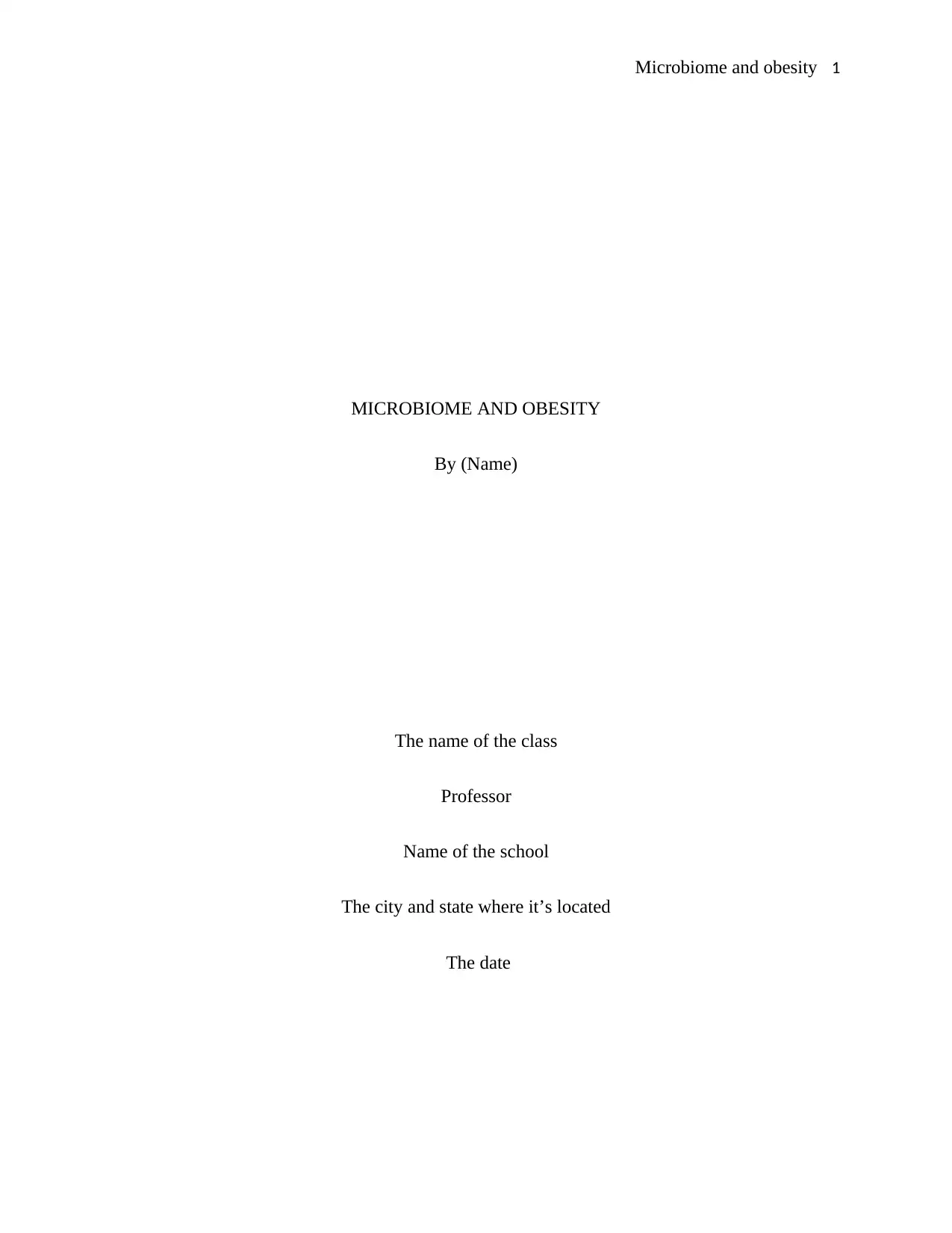
Microbiome and obesity 1
MICROBIOME AND OBESITY
By (Name)
The name of the class
Professor
Name of the school
The city and state where it’s located
The date
MICROBIOME AND OBESITY
By (Name)
The name of the class
Professor
Name of the school
The city and state where it’s located
The date
Paraphrase This Document
Need a fresh take? Get an instant paraphrase of this document with our AI Paraphraser
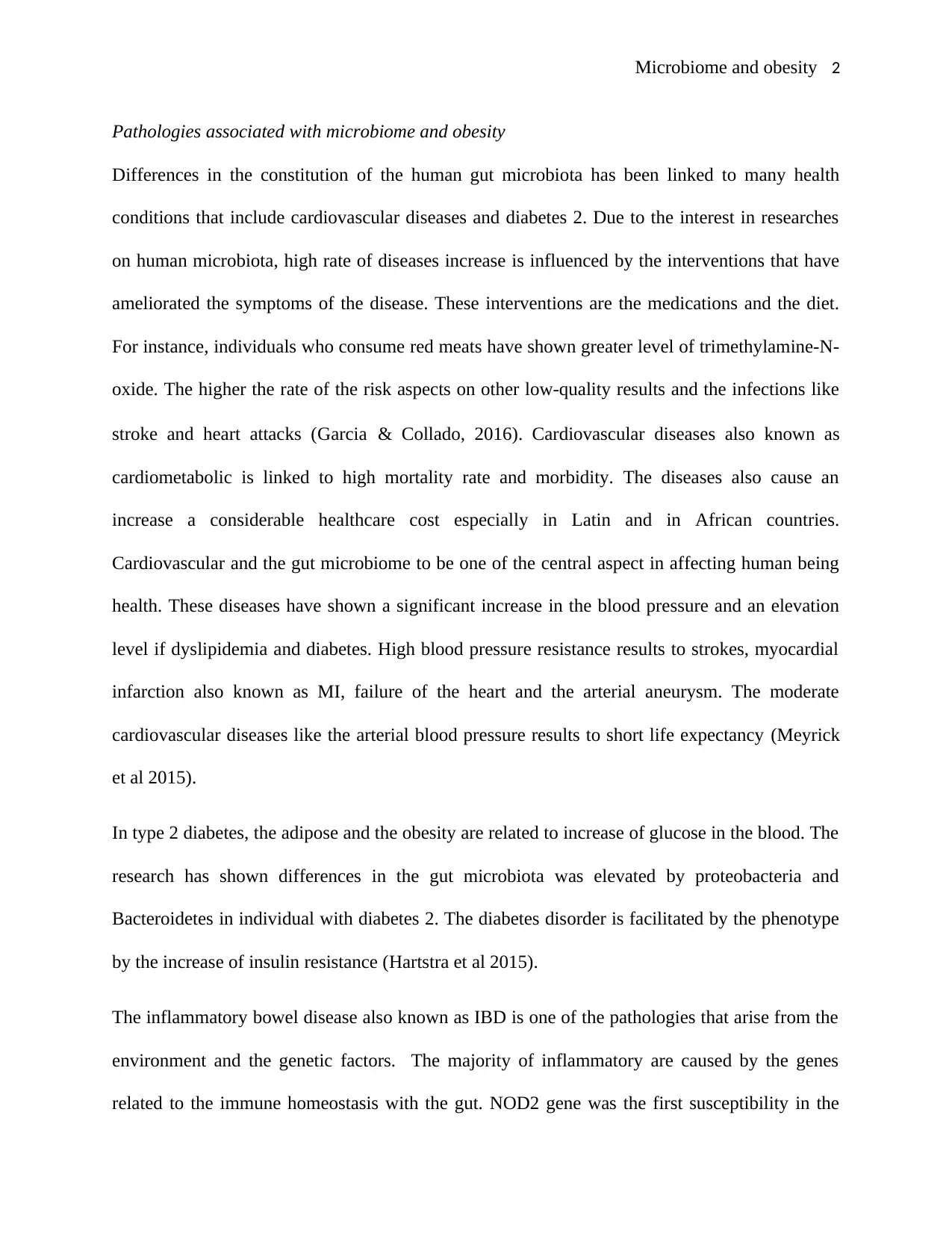
Microbiome and obesity 2
Pathologies associated with microbiome and obesity
Differences in the constitution of the human gut microbiota has been linked to many health
conditions that include cardiovascular diseases and diabetes 2. Due to the interest in researches
on human microbiota, high rate of diseases increase is influenced by the interventions that have
ameliorated the symptoms of the disease. These interventions are the medications and the diet.
For instance, individuals who consume red meats have shown greater level of trimethylamine-N-
oxide. The higher the rate of the risk aspects on other low-quality results and the infections like
stroke and heart attacks (Garcia & Collado, 2016). Cardiovascular diseases also known as
cardiometabolic is linked to high mortality rate and morbidity. The diseases also cause an
increase a considerable healthcare cost especially in Latin and in African countries.
Cardiovascular and the gut microbiome to be one of the central aspect in affecting human being
health. These diseases have shown a significant increase in the blood pressure and an elevation
level if dyslipidemia and diabetes. High blood pressure resistance results to strokes, myocardial
infarction also known as MI, failure of the heart and the arterial aneurysm. The moderate
cardiovascular diseases like the arterial blood pressure results to short life expectancy (Meyrick
et al 2015).
In type 2 diabetes, the adipose and the obesity are related to increase of glucose in the blood. The
research has shown differences in the gut microbiota was elevated by proteobacteria and
Bacteroidetes in individual with diabetes 2. The diabetes disorder is facilitated by the phenotype
by the increase of insulin resistance (Hartstra et al 2015).
The inflammatory bowel disease also known as IBD is one of the pathologies that arise from the
environment and the genetic factors. The majority of inflammatory are caused by the genes
related to the immune homeostasis with the gut. NOD2 gene was the first susceptibility in the
Pathologies associated with microbiome and obesity
Differences in the constitution of the human gut microbiota has been linked to many health
conditions that include cardiovascular diseases and diabetes 2. Due to the interest in researches
on human microbiota, high rate of diseases increase is influenced by the interventions that have
ameliorated the symptoms of the disease. These interventions are the medications and the diet.
For instance, individuals who consume red meats have shown greater level of trimethylamine-N-
oxide. The higher the rate of the risk aspects on other low-quality results and the infections like
stroke and heart attacks (Garcia & Collado, 2016). Cardiovascular diseases also known as
cardiometabolic is linked to high mortality rate and morbidity. The diseases also cause an
increase a considerable healthcare cost especially in Latin and in African countries.
Cardiovascular and the gut microbiome to be one of the central aspect in affecting human being
health. These diseases have shown a significant increase in the blood pressure and an elevation
level if dyslipidemia and diabetes. High blood pressure resistance results to strokes, myocardial
infarction also known as MI, failure of the heart and the arterial aneurysm. The moderate
cardiovascular diseases like the arterial blood pressure results to short life expectancy (Meyrick
et al 2015).
In type 2 diabetes, the adipose and the obesity are related to increase of glucose in the blood. The
research has shown differences in the gut microbiota was elevated by proteobacteria and
Bacteroidetes in individual with diabetes 2. The diabetes disorder is facilitated by the phenotype
by the increase of insulin resistance (Hartstra et al 2015).
The inflammatory bowel disease also known as IBD is one of the pathologies that arise from the
environment and the genetic factors. The majority of inflammatory are caused by the genes
related to the immune homeostasis with the gut. NOD2 gene was the first susceptibility in the
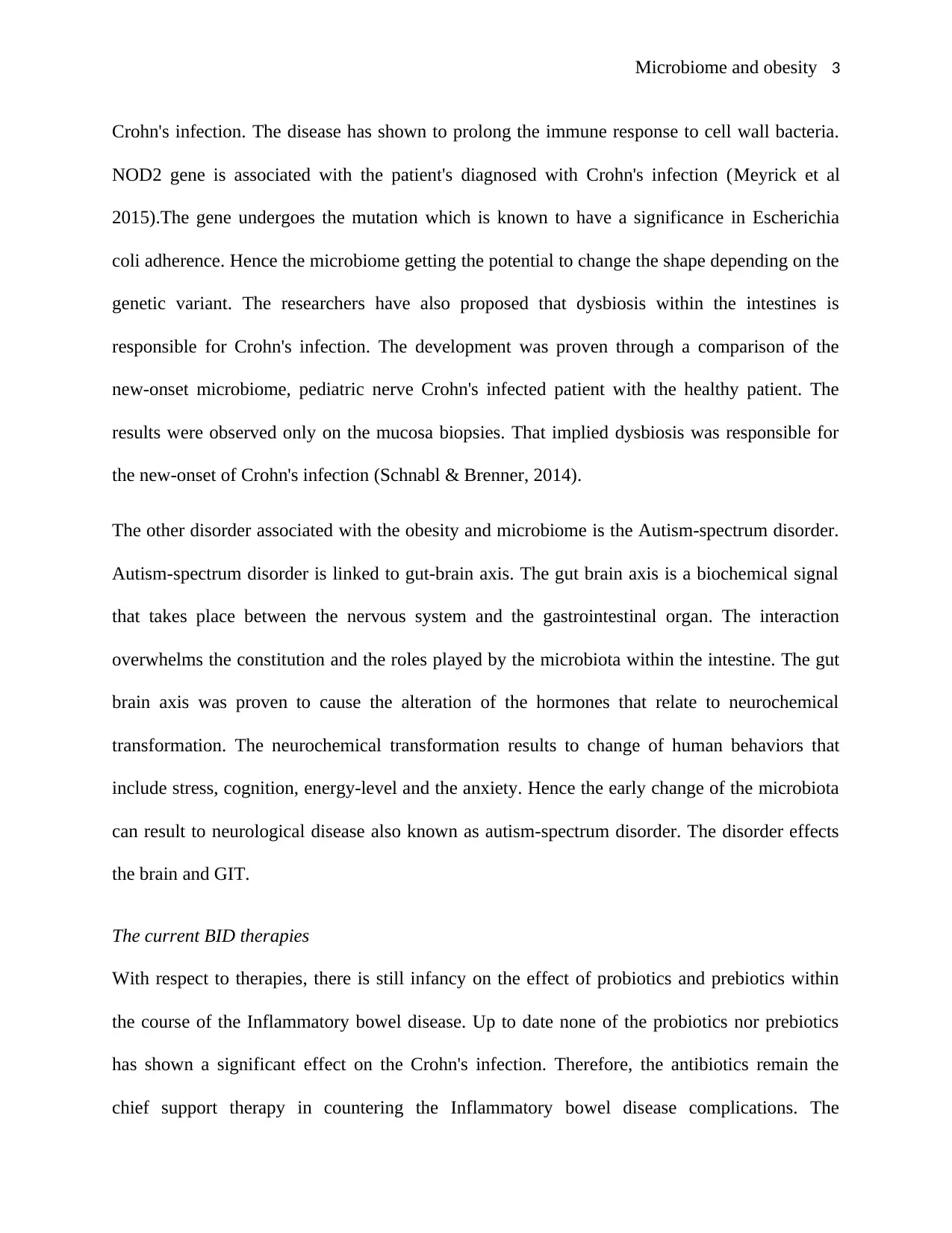
Microbiome and obesity 3
Crohn's infection. The disease has shown to prolong the immune response to cell wall bacteria.
NOD2 gene is associated with the patient's diagnosed with Crohn's infection (Meyrick et al
2015).The gene undergoes the mutation which is known to have a significance in Escherichia
coli adherence. Hence the microbiome getting the potential to change the shape depending on the
genetic variant. The researchers have also proposed that dysbiosis within the intestines is
responsible for Crohn's infection. The development was proven through a comparison of the
new-onset microbiome, pediatric nerve Crohn's infected patient with the healthy patient. The
results were observed only on the mucosa biopsies. That implied dysbiosis was responsible for
the new-onset of Crohn's infection (Schnabl & Brenner, 2014).
The other disorder associated with the obesity and microbiome is the Autism-spectrum disorder.
Autism-spectrum disorder is linked to gut-brain axis. The gut brain axis is a biochemical signal
that takes place between the nervous system and the gastrointestinal organ. The interaction
overwhelms the constitution and the roles played by the microbiota within the intestine. The gut
brain axis was proven to cause the alteration of the hormones that relate to neurochemical
transformation. The neurochemical transformation results to change of human behaviors that
include stress, cognition, energy-level and the anxiety. Hence the early change of the microbiota
can result to neurological disease also known as autism-spectrum disorder. The disorder effects
the brain and GIT.
The current BID therapies
With respect to therapies, there is still infancy on the effect of probiotics and prebiotics within
the course of the Inflammatory bowel disease. Up to date none of the probiotics nor prebiotics
has shown a significant effect on the Crohn's infection. Therefore, the antibiotics remain the
chief support therapy in countering the Inflammatory bowel disease complications. The
Crohn's infection. The disease has shown to prolong the immune response to cell wall bacteria.
NOD2 gene is associated with the patient's diagnosed with Crohn's infection (Meyrick et al
2015).The gene undergoes the mutation which is known to have a significance in Escherichia
coli adherence. Hence the microbiome getting the potential to change the shape depending on the
genetic variant. The researchers have also proposed that dysbiosis within the intestines is
responsible for Crohn's infection. The development was proven through a comparison of the
new-onset microbiome, pediatric nerve Crohn's infected patient with the healthy patient. The
results were observed only on the mucosa biopsies. That implied dysbiosis was responsible for
the new-onset of Crohn's infection (Schnabl & Brenner, 2014).
The other disorder associated with the obesity and microbiome is the Autism-spectrum disorder.
Autism-spectrum disorder is linked to gut-brain axis. The gut brain axis is a biochemical signal
that takes place between the nervous system and the gastrointestinal organ. The interaction
overwhelms the constitution and the roles played by the microbiota within the intestine. The gut
brain axis was proven to cause the alteration of the hormones that relate to neurochemical
transformation. The neurochemical transformation results to change of human behaviors that
include stress, cognition, energy-level and the anxiety. Hence the early change of the microbiota
can result to neurological disease also known as autism-spectrum disorder. The disorder effects
the brain and GIT.
The current BID therapies
With respect to therapies, there is still infancy on the effect of probiotics and prebiotics within
the course of the Inflammatory bowel disease. Up to date none of the probiotics nor prebiotics
has shown a significant effect on the Crohn's infection. Therefore, the antibiotics remain the
chief support therapy in countering the Inflammatory bowel disease complications. The
⊘ This is a preview!⊘
Do you want full access?
Subscribe today to unlock all pages.

Trusted by 1+ million students worldwide
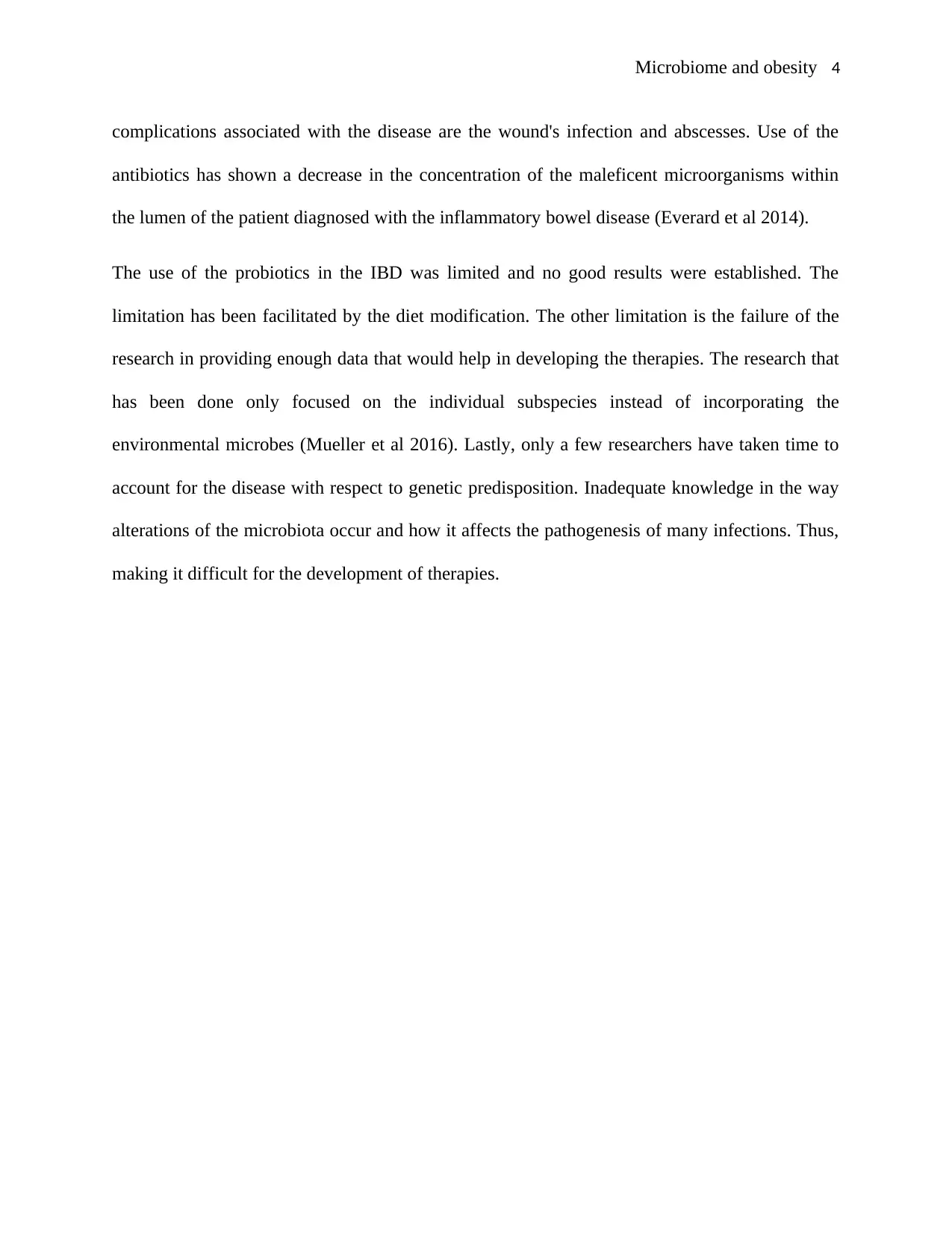
Microbiome and obesity 4
complications associated with the disease are the wound's infection and abscesses. Use of the
antibiotics has shown a decrease in the concentration of the maleficent microorganisms within
the lumen of the patient diagnosed with the inflammatory bowel disease (Everard et al 2014).
The use of the probiotics in the IBD was limited and no good results were established. The
limitation has been facilitated by the diet modification. The other limitation is the failure of the
research in providing enough data that would help in developing the therapies. The research that
has been done only focused on the individual subspecies instead of incorporating the
environmental microbes (Mueller et al 2016). Lastly, only a few researchers have taken time to
account for the disease with respect to genetic predisposition. Inadequate knowledge in the way
alterations of the microbiota occur and how it affects the pathogenesis of many infections. Thus,
making it difficult for the development of therapies.
complications associated with the disease are the wound's infection and abscesses. Use of the
antibiotics has shown a decrease in the concentration of the maleficent microorganisms within
the lumen of the patient diagnosed with the inflammatory bowel disease (Everard et al 2014).
The use of the probiotics in the IBD was limited and no good results were established. The
limitation has been facilitated by the diet modification. The other limitation is the failure of the
research in providing enough data that would help in developing the therapies. The research that
has been done only focused on the individual subspecies instead of incorporating the
environmental microbes (Mueller et al 2016). Lastly, only a few researchers have taken time to
account for the disease with respect to genetic predisposition. Inadequate knowledge in the way
alterations of the microbiota occur and how it affects the pathogenesis of many infections. Thus,
making it difficult for the development of therapies.
Paraphrase This Document
Need a fresh take? Get an instant paraphrase of this document with our AI Paraphraser
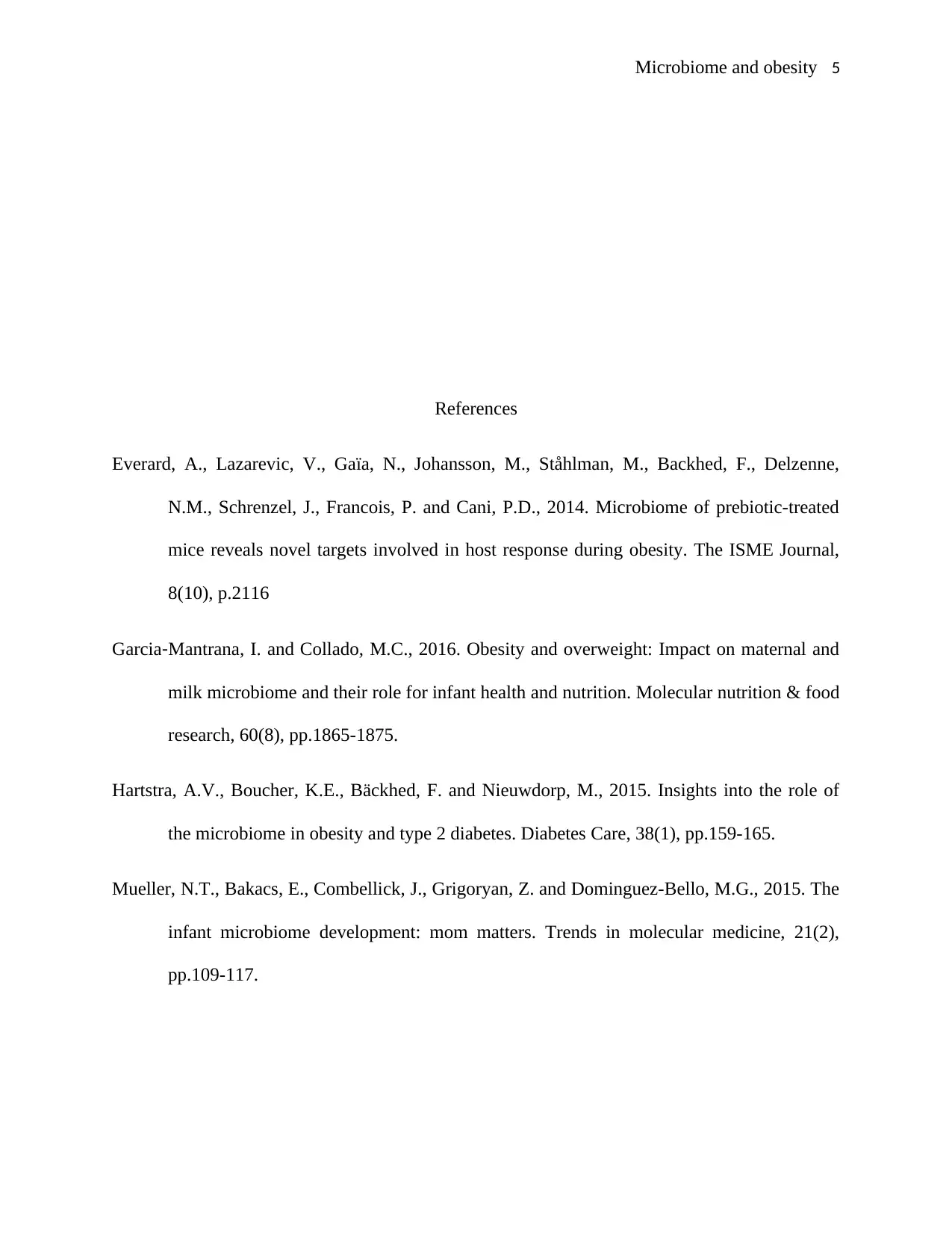
Microbiome and obesity 5
References
Everard, A., Lazarevic, V., Gaïa, N., Johansson, M., Ståhlman, M., Backhed, F., Delzenne,
N.M., Schrenzel, J., Francois, P. and Cani, P.D., 2014. Microbiome of prebiotic-treated
mice reveals novel targets involved in host response during obesity. The ISME Journal,
8(10), p.2116
Garcia‐Mantrana, I. and Collado, M.C., 2016. Obesity and overweight: Impact on maternal and
milk microbiome and their role for infant health and nutrition. Molecular nutrition & food
research, 60(8), pp.1865-1875.
Hartstra, A.V., Boucher, K.E., Bäckhed, F. and Nieuwdorp, M., 2015. Insights into the role of
the microbiome in obesity and type 2 diabetes. Diabetes Care, 38(1), pp.159-165.
Mueller, N.T., Bakacs, E., Combellick, J., Grigoryan, Z. and Dominguez-Bello, M.G., 2015. The
infant microbiome development: mom matters. Trends in molecular medicine, 21(2),
pp.109-117.
References
Everard, A., Lazarevic, V., Gaïa, N., Johansson, M., Ståhlman, M., Backhed, F., Delzenne,
N.M., Schrenzel, J., Francois, P. and Cani, P.D., 2014. Microbiome of prebiotic-treated
mice reveals novel targets involved in host response during obesity. The ISME Journal,
8(10), p.2116
Garcia‐Mantrana, I. and Collado, M.C., 2016. Obesity and overweight: Impact on maternal and
milk microbiome and their role for infant health and nutrition. Molecular nutrition & food
research, 60(8), pp.1865-1875.
Hartstra, A.V., Boucher, K.E., Bäckhed, F. and Nieuwdorp, M., 2015. Insights into the role of
the microbiome in obesity and type 2 diabetes. Diabetes Care, 38(1), pp.159-165.
Mueller, N.T., Bakacs, E., Combellick, J., Grigoryan, Z. and Dominguez-Bello, M.G., 2015. The
infant microbiome development: mom matters. Trends in molecular medicine, 21(2),
pp.109-117.
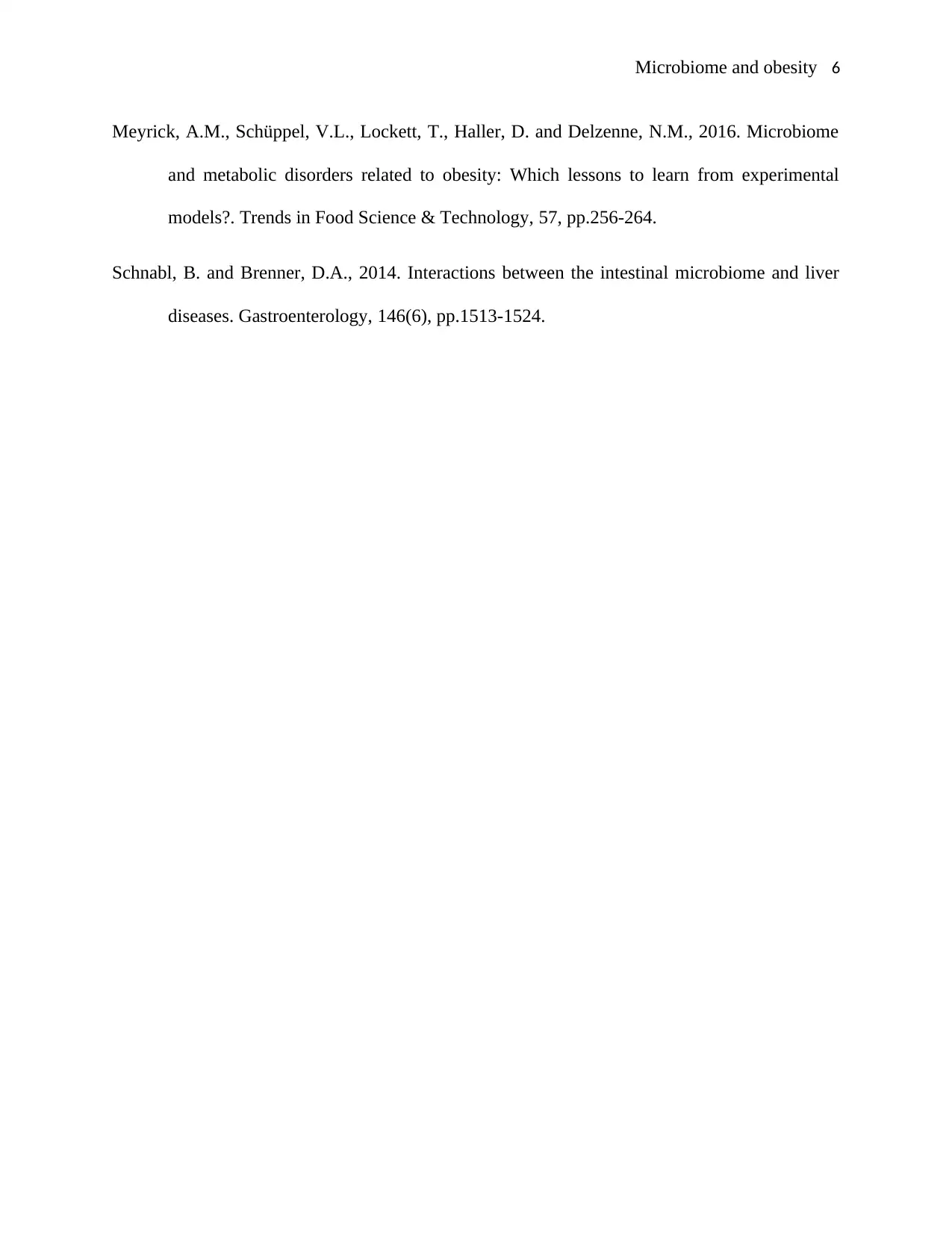
Microbiome and obesity 6
Meyrick, A.M., Schüppel, V.L., Lockett, T., Haller, D. and Delzenne, N.M., 2016. Microbiome
and metabolic disorders related to obesity: Which lessons to learn from experimental
models?. Trends in Food Science & Technology, 57, pp.256-264.
Schnabl, B. and Brenner, D.A., 2014. Interactions between the intestinal microbiome and liver
diseases. Gastroenterology, 146(6), pp.1513-1524.
Meyrick, A.M., Schüppel, V.L., Lockett, T., Haller, D. and Delzenne, N.M., 2016. Microbiome
and metabolic disorders related to obesity: Which lessons to learn from experimental
models?. Trends in Food Science & Technology, 57, pp.256-264.
Schnabl, B. and Brenner, D.A., 2014. Interactions between the intestinal microbiome and liver
diseases. Gastroenterology, 146(6), pp.1513-1524.
⊘ This is a preview!⊘
Do you want full access?
Subscribe today to unlock all pages.

Trusted by 1+ million students worldwide
1 out of 6
Your All-in-One AI-Powered Toolkit for Academic Success.
+13062052269
info@desklib.com
Available 24*7 on WhatsApp / Email
![[object Object]](/_next/static/media/star-bottom.7253800d.svg)
Unlock your academic potential
Copyright © 2020–2026 A2Z Services. All Rights Reserved. Developed and managed by ZUCOL.